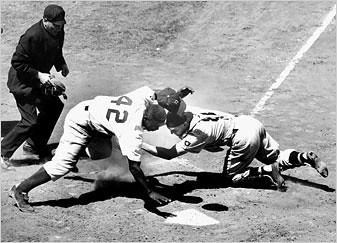
Jackie Robinson stealing home plate for the Brooklyn Dodgers. 2007 represents the 60th anniversary of the integration of Major League Baseball. This resulted from a civil rights campaign involving the NAACP, Paul Robeson and many others., a photo by Pan-African News Wire File Photos on Flickr.
Originally published April 18, 2012
Jackie Robinson Day Brings Light to Shortage of African-American Players in MLB
by Perry Green
AFRO Sports Editor
MLB continued its three-year old tradition of Jackie Robinson Day, honoring the legendary African-American athlete who broke down the color barrier of pro baseball when he became the first Black MLB player after signing with the Brooklyn Dodgers 65 years ago. Every player and manager of every team league-wide sported Robinson’s jersey number (42) on April 16, celebrating the historical figure that helped make segregation in the U.S. a thing of the past.
But according to reports, the percentage of African-American players in MLB in 2012 is at its lowest point since Robinson first kicked in the door for Blacks to play in the big league. USA Today reports that only 8.05 percent of MLB players are African Americans, a huge decline from the 27 percent during the peak of Black players in 1975; the report added that the Black players’ presence was at 19 percent as recently as 1995.
"Baseball likes to say things are getting better," said Dave Stewart, a former pitcher and front-office executive, according to USA Today. "It's not getting better. It's only getting worse. We've been in a downward spiral for a long time, and the numbers just keep declining."
Rob Parker, a sports columnist for ESPN, believes the lack of Black players is attributed to the league’s increased interest in recruiting international talent as opposed to farming and developing talent among the urban communities here in the U.S.
“Everybody wants to say that all the Black athletes only want to play football and basketball, and part of that is true. But that’s not the reason why you have far more Hispanics year in and year out coming to baseball,” Parker said during a live TV airing of ESPN First Take on April 16. “It’s because about 15 or so years ago, baseball basically outsourced its jobs to Latin America. It decided that ‘you reap what you sow’ so if you set up baseball clinics and camps in the Dominican Republic and Venezuela and all over, those are the kids that you’re going to develop.”
Parker went on to say that if MLB set up the same baseball clinics in the African-American communities, promoting and encouraging Blacks youths to play baseball daily, there would be not only more Blacks players but more Black fans of baseball in general.
Ryan Clark, an NFL player for the Pittsburgh Steelers, was featured on the same ESPN First Take show with Parker. Clark hinted that Black youths don’t see enough African-American stars in MLB so those youths aren’t as motivated to pursue the sport.
“The people that [Black youths] can relate to, you don’t see them in commercials or on TV; you see the [Derek] Jeters or the [Albert] Pujos [promoting] baseball, not the [Black NBA stars like] LeBron or Kobe so basketball stars are who they want to be like because that’s what they see.”
But Curtis Covington of Forest Park Little League Baseball based in Baltimore, Md. said there are some urban communities that still train and develop tons of Black baseball talent. Forest Park Little League travels all over the country, beating some of the best youth baseball programs established.
Still, Covington believes potential Black baseball players are being “overlooked.”
“Our kids are not being showcased at the high school and college level where the pro-scouts go to discover talent,” he said.
MLB commissioner Bud Selig told reporters that the league is working to address the issue that Covington has pointed out.
"We're trying to get better," Selig told USA Today. "It won't happen overnight. And we're very comfortable saying it will be better. We are doing great work with our baseball academies and working in the inner cities. It's going to get better."
No comments:
Post a Comment